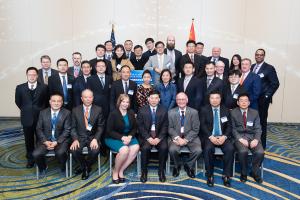Delegates from U.S. and Chinese government agencies, biofuels companies and research institutes discussed fuel ethanol production, use and policy during the Sino-U.S. Advanced Biofuels Forum this week in Arlington, Virginia.
The forum follows a September 2017 joint release by the Chinese National Development and Reform Commission (NDRC), the National Energy Administration (NEA) and 13 other departments of a plan to expand bioethanol fuel production and promote the use of fuel ethanol across China, setting a goal of nationwide E10 adoption by 2020. The forum shared information about the development of the U.S. ethanol industry as China creates its own regulatory framework on biofuels to meet the country’s mandate.
China currently has a blend rate of E2.5 on a nationwide average. For 2018, China will require a four-fold increase in ethanol use to meet an E10 mandate, which will increse as vehicle ownership and demand for fuel increase over the next generation.
“The Council has had a partnership with China for more than three decades, focused on helping China achieve its agriculture development goals,” said Deb Keller, USGC chairman and a farmer from Iowa, in opening remarks at the conference. “We share the same goals and face similar challenges in promoting biofuel development. The Council is thrilled to continue our partnerships in China and especially to support China in meeting the E10 mandate announced in September.”
The biofuels forum is the fifth in a series conducted since the United States and China officially launched the Sino-U.S. Renewable Energy Partnership in May 2010. The forums are intended to further develop and strengthen the relationship between the U.S. and Chinese biofuels industries as well as encourage closer coordination between the two countries.This collaboration was initiated in 2007 by a memorandum of understanding signed between the Chinese NDRC/NEA and the U.S. Departments of Agriculture and Energy.
Speakers at the biofuels forum covered a wide array of topics, including biofuels policies, market mechanisms, compliance systems and technological innovation as well as the environmental and health benefits of biofuels in addressing air quality and greenhouse gas emissions.
In addition to the forum, key members of the Chinese delegation participated in a team visit to Illinois, Iowa and California to visit ethanol plants and blending stations as well as meet with policy makers. Through the combination of the biofuels forum and field visits, the Chinese delegation learned how the U.S. fuel ethanol system developed, aiding China in promoting E10 in their own country.
“The forum brought together leaders from the political, scientific and industrial fields in biofuels from China and the United States to establish a platform for exchange, dialogue and cooperation on the development and transformation in the future from a global perspective and to discuss the opportunities and challenges to be faced in the future development of global bioenergy as well as to share technological innovations and helpful experiences in bioenergy industry,” said Siqiang Wang, director general of the Chinese NEA’s Department of Energy Conservation and Technology Equipment, at the conference. “The enhanced cooperation in the biofuels industry will further enrich the cooperation between the two countries.”
Learn more about the Council’s work on promoting ethanol here.



